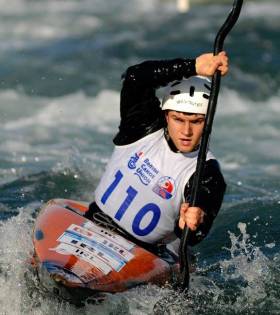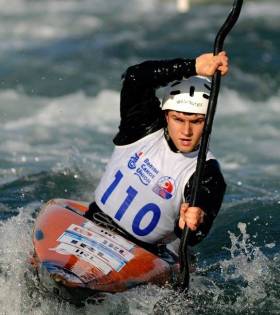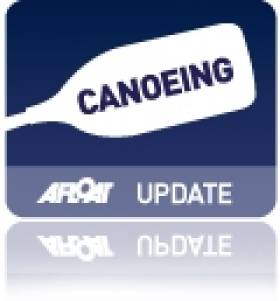Displaying items by tag: Sam Curtis
Ireland Miss Out on Semi-Final Qualification at World Championships
#Canoeing: Ireland’s three competitors in the men’s K1 (racing kayak) failed to make it through to the semi-finals of the canoe slalom World Championships in Spain today. Eoin Teague, who had a good first run, had five touches in his second – including two on the last three gates – and fell out of contention. Oisin Farrell and Sam Curtis, who both had had two touches each, were also not fast enough to make the top 10 who made it through from this round.
Caoimhe O’Ferrall did not make it through in the women’s C1.
Canoe Slalom World Championships, La Seu d’Urgell, Spain (Irish interest)
Men
K1 – First Run (Top 20 qualify directly for Semi-Finals): 43 E Teague 94.91 seconds, 98 S Curtis 151.52, 100 O Farrell 153.04. Second Run (Top 10 qualify): 37 Curtis 101.25, 43 Farrell 104.69, 45 Teague 105.30.
Women
C1 – First Run (Top 20 qualify directly for Semi-Finals): 64 C O’Ferrall 287.36. Second Run (Top 10 qualify): 39 O’Ferrall 184.60
Teague Best of Irish In First Run at World Championships
#Canoeing: Eoin Teague was the top Ireland performer after the first run of the men’s K1 at the canoe slalom World Championships. Teague negotiated the course with no touches. His time of 94.91 put him in the lead – but there is a huge entry, and he was pushed out of the top 20 which would have seen him qualify at this stage. Sam Curtis and Oisin Farrell were both given 50-second penalties for missing gates.
Caoimhe O’Ferrall took 64th in her first run in the women’s C1.
Canoe Slalom World Championships, La Seu d’Urgell, Spain (Irish interest)
Men
K1 – First Run (Top 20 qualify directly): 43 E Teague 94.91 seconds, 98 S Curtis 151.52, 100 O Farrell 153.04
Women
C1 – First Run (Top 20 qualify directly): 64 C O’Ferrall 287. 36
Liam Jegou Wins at Canoe Slalom Irish Open
#Canoeing: Liam Jegou, Sam Curtis and Aisling Conlan all had wins at the canoe slalom Irish Open at the Sluice Weir in Lucan today. Jegou, who travelled from his base in Pau in France for the event, was the top C1 paddler, while Curtis and Conlan won their K1 events. The Ireland selection event for the season will be held at La Seu d’Urgell in Spain next month.
Canoe Slalom Irish Open, Dublin, Sunday (Selected Results; results on best of two runs)
Men
K1: Sam Curtis 79.87 seconds. Junior: Adam Vaugh 93.82.
C1: Liam Jegou 81.76
Women
K1: Aisling Conlan 103.20.
Curtis Left To Rue Close Call at World Championships
#Canoeing: Sam Curtis was left to rue his close miss in the first run of the under-23 K1 at the canoe slalom World Championships in Krakow in Poland. The Irishman had to wait around for a protracted period as a technical issue was sorted out in the middle of the second run, and he did not do well. He touched five gates and missed one – gate 11. He was well outside the qualifying mark for the semi-finals. Noel Hendrick and Eoin Teague also missed out.
Canoe Slalom World Championships, Under-23 and Junior, Krakow, Poland (Irish interest; selected results)
Men
Under-23 K1 (racing kayak) – First Run (Top 30 Qualify): 35 S Curtis 86.08; 69 E Teague 137.71; 70 N Hendrick 138.45. Second Run (10 Qualify): 22 Hendrick 94.34; 35 Teague 137.21; 38 Curtis 144.47.
Junior K1 – First Run (30 Qualify): 50 S Ansell 110.33; 63 C McLarnon 150.29; 74 C Vaugh 214.05. Second Run: 28 Ansell 109.79; 38 Vaugh 148.67; 44 McLarnon 185.63.
Women
Under-23 K1 – First Run (15 Qualify): 30 C O’Ferrall 156.80. Second Run (5 Qualify): 23 O’Ferrall 251.16.
Olympic Canoe Slalom Qualifying Spots Snapped Up in Lucan
#CANOEING - The Irish Times reports that Eoin Rheinisch and Ciarán Heurteau have secured their canoe slalom qualification spots for London 2012 after last weekend's selection races in Lucan.
Three places were up for grabs in the men's K1, with the third yet to be confirmed after fourth-placed Patrick Hynes contested a touch on a gate by third-place finisher Sam Curtis.
Canoeing Ireland's recently appointed general manager Karl Dunne said the objection is currently being considered.Meanwhile, in the women's K1, the qualifying spots went go Hannah Craig, Helen Barnes and Aisling Conlon.
The qualifiers will be part of the European Championships in Augusburg, Germany from 10-13 May, where Olympic spots are available for boats from two countries not already qualified.































































